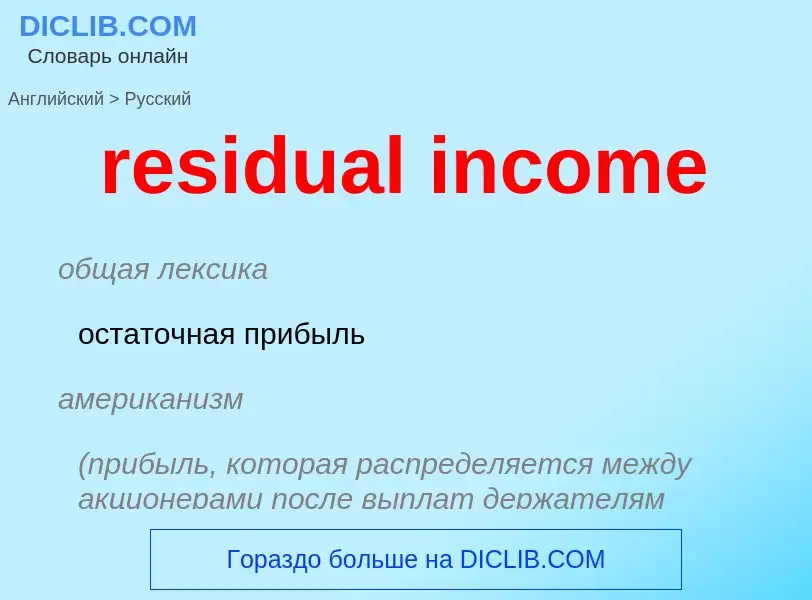Übersetzung und Analyse von Wörtern durch künstliche Intelligenz ChatGPT
Auf dieser Seite erhalten Sie eine detaillierte Analyse eines Wortes oder einer Phrase mithilfe der besten heute verfügbaren Technologie der künstlichen Intelligenz:
- wie das Wort verwendet wird
- Häufigkeit der Nutzung
- es wird häufiger in mündlicher oder schriftlicher Rede verwendet
- Wortübersetzungsoptionen
- Anwendungsbeispiele (mehrere Phrasen mit Übersetzung)
- Etymologie
residual income - Übersetzung nach Englisch
общая лексика
остаточная прибыль
американизм
(прибыль, которая распределяется между акционерами после выплат держателям облигаций и привилегированных акций)
синоним
Смотрите также
банковское дело
процентный доход
доход от процентов (доход, полученный в форме процентов (напр. доход по облигациям, сберегательным счетам и т. д.))
Смотрите также
Wikipedia
Passive income is a type of unearned income that is acquired automatically with minimal labor to earn or maintain. It is often combined with another source of income, such as a side job. In the United States, the IRS divides income into three categories: active income, passive income, and portfolio income. Passive income, as an acquired income, is the result of capital growth or is related to the tax deduction mechanism, and is taxable.
It is called progressive passive income when the earner expends little effort to grow the income. Examples of passive income include rental income and business activities in which the earner does not materially participate. Some jurisdictions' taxing authorities, such as the Internal Revenue Service in the United States of America, distinguish passive income from other forms of income, such as earnings from regular or contractual employment, and may tax it differently.
It can take a long period of work and accumulation before passive income can be earned. Passive income can be a way of creating financial independence and early retirement, because the beneficiary will receive an income regardless of whether they are materially active in the activity creating the revenue.
Passive income is not always a lump sum payment, like an inheritance or proceeds from the sale of an asset such as a home or stock. It can also come from a source that has a likely continuity over time but is not guaranteed. Some passive incomes may last for several years, or even centuries across generations. Examples of these longer term sources of passive income can include: property; dividends; debt; and other appreciating asset classes.
Just because one person considers a source of income to be passive, does not mean it was the case in creation of the wealth/revenue/asset value increase. Whilst to the end beneficiary the income may be passive, there can often be effort expended by others to generate value, such as renovations to modernize and enhance a building that increases rental income and/or creates an increase in the property's value. The degree of passivity of an income depends on the perspective of the person concerned. What one person sees as passive income may be the active income to another person.
Generally speaking, high-income groups have more diversified sources of revenue leading to a higher probability to have access to hidden income, and therefore passive income can also be a good excuse for tax avoidance by transferring active income into the passive one. The loophole has resulted in a large amount of "passive income" such as income from property transfer and property leasing, and even "earned income" such as income from non-regularly occurring labor remuneration, which to a large extent has not been taxed to the fullest extent. As a result, there is voice from the public that personal tax has been degraded to a "wage tax" aimed at exploited middle income working class.

